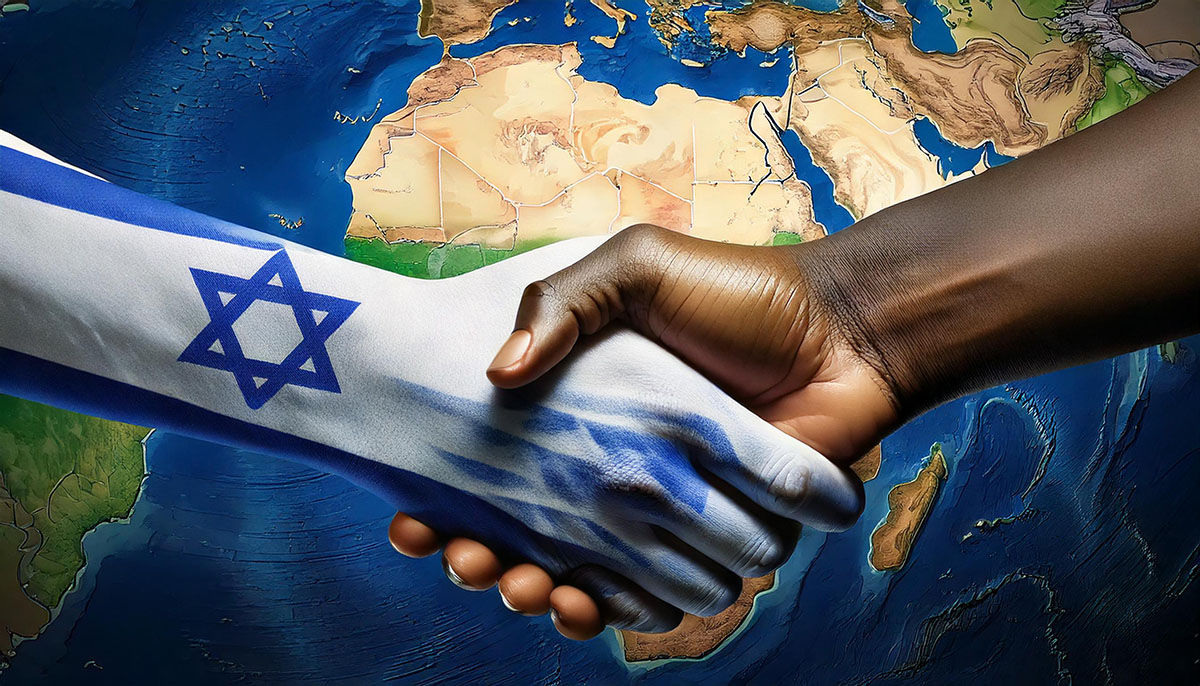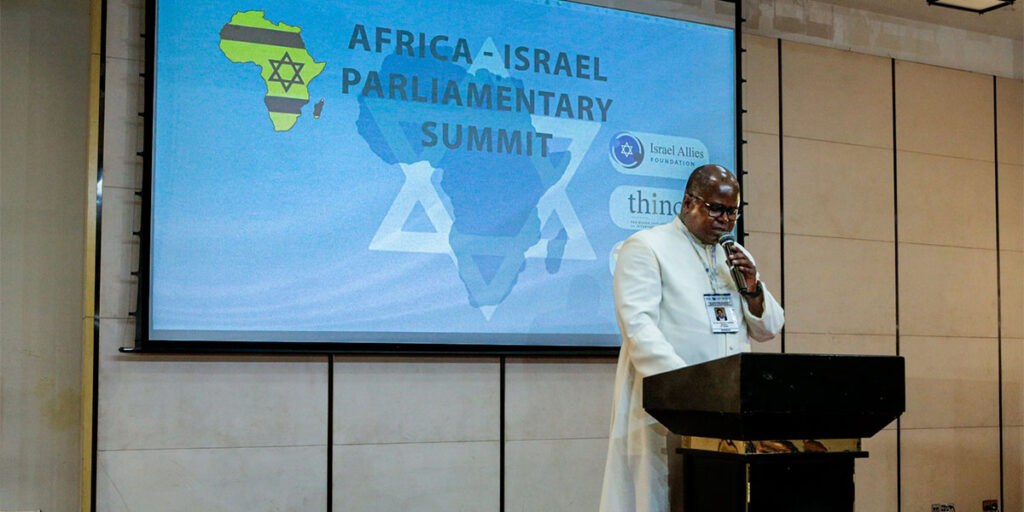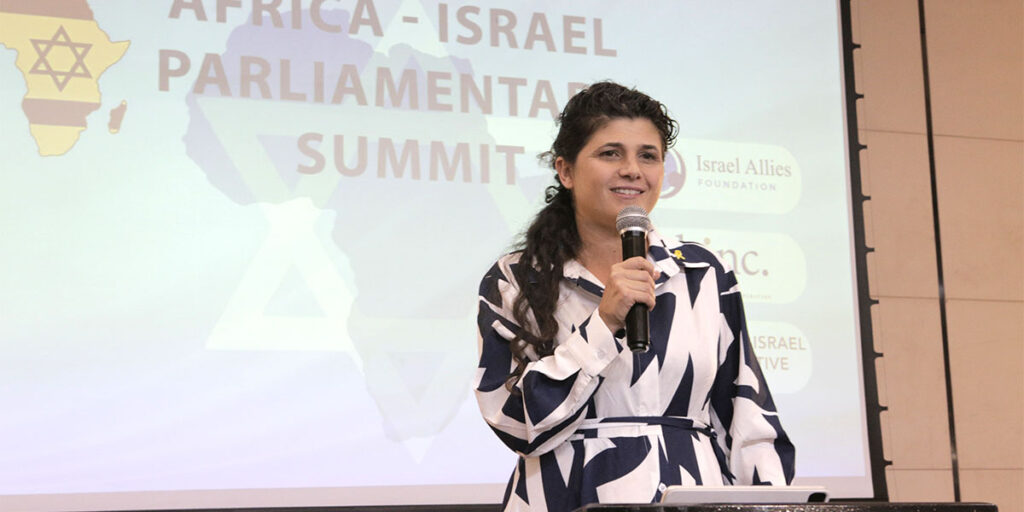
Frantic attempts have been made over the years to restore the original ties that existed between Africa and Israel before the Yom Kippur War of 1973, but little, if any, was achieved. It was like taking one step forward, and two steps backwards whenever an attempt was made.
The Africa Israel Initiative (AII) was borne in 2012, out of the desire and passion to restore those ties. Between then and now, the AII has established centers in twenty five (25) countries from all the four regions of the African continent. These centers include a Board, staff and volunteers. It is all about bringing the African continent and Israel to enjoy past pleasantries and stand with each other to enhance organic development.
In September 2024, AII brought together, twenty-five law makers from nineteen countries to the diplomatic capital of Africa, Addis Ababa to sign a memorandum to stand with Israel. The event was witnessed by top Church leaders in Africa; prominent among them include: Bishop Joshua Mulinge, Rev Dr Louison Emerick Bissila Mbila, AU Chaplain, Bishop Dennis Nthumbi and many more. Here’s what they had to say:
Dr Louison Emerick Bissila Mbila, C.S.Sp. spoke on THE FAITH JOURNEY OF AFRICA AND ISRAEL AND THE IMPORTANCE OF UNITY:
Unity is our collective aspiration, and it holds great significance that our meeting is being held in the capital of the African Union, Addis Ababa, a new symbol of friendship between Africa and Israel. This journey, as we shall explore, commenced many millennia ago. Israel is Africa’s geographical neighbour. The land of Israel shares a border with Egypt, an African country. In ancient times, the Via Maris and the King’s Highway, which pass through Israel, have facilitated numerous cultural and economic exchanges between our peoples. Yet, beyond geographical proximity, Africa and Israel, Africans and the Hebrews, have an ancient bond that stretches back millennia.

Our common ancestor in faith, Abraham, a descendant of Shem, sojourned in Egypt, the land of Ham, situated in Africa. He arrived there as an economic immigrant, as we would say today, “due to a severe famine in the land.” (Genesis 12:10). When he left our continent, he departed with great wealth, possessing herds, silver, and gold (Genesis 13:1-2). One does not journey to Africa and leave empty-handed. The mutually beneficial partnership between Abraham’s descendants and Africans had already begun.
The kings of Judah and Israel were not averse to forming strategic alliances with them in order to counter Assyria’s ambitions, although some prophets were not always in favour of such partnerships. Clearly, centuries before the birth of European nation-states and the establishment of the modern State of Israel, collaboration between Israel and Africa was already evident. The friendship between Israel and Africa was well-established.
Let us now cite a few passages from the Bible that speak of the shared destiny of the peoples of Africa and Israel:
Zephaniah: “From beyond the rivers of Ethiopia, my scattered children, those who worship me, will bring me offerings.” (Zephaniah 3:10). Isaiah prophesied, “On that day, the Lord will once again stretch out His hand to gather the remnant of His people, those who will return from Ashur and Egypt, from Patros, Ethiopia and Elam, from Shinar, Hamath and the islands of the sea.” (Isaiah 11:11). In the book of Psalms, it is written, “Egypt will come sumptuous garments; Ethiopia will come to God with her hands full.” (Psalm 67:31).
Furthermore, a Christian who denies their Jewish roots contradicts themselves. Yeshua, Yosef, and Miriam, who sought refuge in our continent to escape Herod’s persecution (Matthew 2:13-21), were all Jews, as were the Twelve Apostles. To deny Judaism means denying one’s own heritage. Just like a tree without roots, without acknowledging our roots, we wither away!
What we are doing today is, in a way, reviving the historical connections between Africa and Israel to enhance collaboration between our nations. Israel and Africa share a history of suffering inflicted by those who spread darkness. Throughout history, the Jewish people have faced attempted extermination. The language used to describe this genocidal intent may have changed, but the disdain for Abraham’s descendants persists. In 722/721 BC, the Assyrians exiled the ten tribes of Israel, and in 587/586 BC, the Babylonians exiled the Kingdom of Judah.
During Queen Esther’s time, Haman plotted to annihilate all the Jews in the Persian Empire. The first two books of the Maccabees illustrate efforts to assimilate and erase Jewish identity. Antiochus Epiphanes sought to eradicate Jewish distinctiveness. Jews have endured persecution by the Greeks, Romans, Inquisition, and various European powers throughout history, based solely on their Jewish identity and loyalty to the God of the Covenant. This long history of disdain reached its peak with the Shoah, resulting in the loss of six million Jewish lives. A visit to Yad Vashem in Jerusalem leaves an indelible impact, showcasing the unimaginable suffering endured by Jews in the last century.
Africans have also been victims of ideologies of hatred. They were subjected to slavery at the hands of Arabs and Europeans, a dark period lasting many centuries. While the transatlantic slave trade is well-documented, there are those who choose to remain silent about the Arab slave trade, displaying hypocrisy. In his book “Le génocide voilé” (The Veiled Genocide), Tidiane N’diaye writes, “While the transatlantic slave trade lasted four centuries, the Arabs continuously raided sub-Saharan Africa for thirteen centuries. Most of the millions of men they deported disappeared due to inhumane treatment and widespread castration.” (Tidiane N’Diaye, Le genocide voile. Enquête historique, Paris, Gallimard, 2008, p. 10). After slavery, colonization and neo-colonialism have continued to degrade the African people, their culture, and their environment. Consequently, the African and Jewish nations are united in history through their experiences of contemptuous ideologies and practices. It is in the best interest of Africa and Israel to join forces and confront the common challenges of anti-Judaism and racism together.
In conclusion, I would like to outline three fundamental reasons why Africans should align themselves with Israel today.
The first reason is geopolitical. In today’s world, where multilateralism is considered crucial, sovereign nations, whether individually or as part of groups, seek the freedom to collaborate with any nation of their choosing, without being subjected to the impositions of former colonial powers. An example of this is the significant criticism directed towards the relationship known as “FrançAfrique” in French-speaking Africa. The continent now seeks to embrace win-win partnerships with various powers and nations, including China, Japan, Russia, India, Brazil, and many others. Therefore, it is paradoxical that working with Israel should be seen as taboo, especially at a time when multilateralism is valued. Intellectual hypocrisy should be discarded, and it should be acknowledged that African nations are free to collaborate with Israel.
Furthermore, international organizations to which African states belong should respect the choice of the people. Anything short of this raises concerns.
The second reason why Africans should align themselves with Israel is to address their tendency towards forgetfulness. Judaism is a religion that emphasizes the importance of remembering. It is often observed that we Africans have a tendency to forget, thereby elevating those who have caused us suffering and disregarding those who have our best interests at heart. Chief Rabbi Albert Guigui provides insight on this matter, stating: “Memory is not meant to be demoralizing or passive; rather, it should inspire hope. The word ‘zachor’ appears in the biblical text a staggering 190 times. It is crucial that we remember our identity, our history, and our past. Only through a continuous examination of our past and a deep understanding of our history can we ensure our survival. We must learn from the past in order to enlighten our future. Failure to do so carries the risk of reliving past mistakes.” (Albert Guigui, Dieu parle aux hommes, Bruxelles, Éditions Racine, 2007, p. 63–64).
Lastly, Africa can gain a valuable lesson in hope from Israel. Pope Francis refers to Africa as “the continent of hope,” and Israel’s national anthem, Hatikvah, means “The Hope.” It symbolizes the unwavering hope of a people who have preserved their aspirations of returning to their ancestral land throughout the centuries. Today, we witness that with HaShem, everything is possible. The strength of Israel lies in the land of Israel: Hahazaka am Yisrael eretz Israel. What we now know as Medinat Yisrael is, in essence, the fulfilment of God’s promise to settle His people in their land.
Sharren Heskel, Member of the Knesset:
I am grateful to address you at this critical moment for Israel, the Jewish People, and If I may say, for all nations of Africa and the entire free world. In modern terms, it is customary to view the relationship between Israel and African countries as existing for only about 150 years. it’s true that at the end of the 19th century, initial connections were made between the leaders of the Zionist movement at that time in Europe and in Ottoman-ruled Holy Land – with Jewish and Christian communities on this magnificent continent. The forefather of Zionism, Benjamin Ze’ev Theodor Herzl, mentioned the suffering experienced by African peoples in his book אלטנוילנד “Old new land” expressing hope to assist in the struggle of African countries for equality and self-determination, writing: “I am not ashamed to say, though I may expose myself to ridicule for saying so, that once I have witnessed the redemption of the Jews, my people, I wish also to assist in the redemption of the Africans”. Herzl also dreamt of a physical connection between the future Jewish state and African nations, when he spoke of railroads for express trains, from the Jewish State to across Africa. Even after the establishment of the State of Israel, its early leaders worked to establish and promote ties between Israel and African countries. Golda Meir, who later became Prime Minister of Israel, devoted in her time as Foreign Minister, to Israel’s African ties, forging accords which also underscored the ideological importance Israel placed in its relationship with Africa. In 1958, Israel, led by Golda Meir, founded MASHAV, the Hebrew acronym for the Center for International Cooperation, which served as the hub for coordinating technical agreements with African countries. Through MASHAV We formed strong Bilateral relations, in which Israel brought students from African countries to Israeli institutions, to teach the latest agricultural and development techniques, and sent Israeli experts that would then visit African states, providing on-the-ground expertise. By the 1960s Israel had established diplomatic relations with thirty-three African countries, including all of the sub-Saharan states. This relation was first based on shared values. As Jews, who had suffered centuries of persecution and displacement, there was a natural understanding, identification, and solidarity with African nations, who had also struggled against colonialism and racism. In her memoirs, Meir emphasized the strong similarities between African countries and Israel, the liberation from foreign rule and the struggle for self-determination, the need to learn by ourselves, step by step, how to cultivate the land, how to live together as an old people in a new country with a new government, and also how to defend ourselves from those who wish us harm. She said: “I am proud of the Israeli program for international cooperation with the people of Africa, more than I am proud of any single project we have ever initiated.”

But, in fact, Israel and Africa’s relationship dates much further back – it is thousands of years old. Going back as far as the first time Abraham traveled to Egypt with Sarah and the connection between biblical Israelites and the Kingdom of Sheba and Kush- we are one family; we are brothers and sisters. My dear friends, while taking note of our common past, I am here to talk about the future, and not all of it is bright. The next World War may be knocking on our front door. This world war to which I am referring to is between the idea of world Islamic dominance, Jihad, radical Islam – versus nations and people who pursue peace, freedom, and equality. History is repeating it self. We, the Jewish people know, as it always starts with the hatred and persecution of Jews and then spread to the rest of the world. Like the holocaust- the Shoa, in Europe, that started with the violent hatred toward Jews. The world was silent, and then came violence, death and destruction against all humanity.
If we establish the Queen of Sheba Accords as the foundation for a joint security and defense alliance we will be able to defeat radical Islam much quicker and with less casualties.
If we want to defeat the radical Islamist front of political influence, then let’s join forces together and create in the Queen of Sheba Accords an economic alliance that will create resilience against the enormous amount of money and influence Iran is buying.
If we want to fight the media and social media war that’s influencing the younger generation, then we need to create a framework together that will create awareness and information, but most of all will be a declaration to the radicals that our friendship ties and bonds are strong like irons and our guards will not fall down.
And if we want to fight the religious front, then we have to believe in our identity, our religion and our culture. We need to strengthen it based on educational corporation, a historical alliance that will teach her history and the lesson that needs to be learned.
We read from the Bible the warnings, and we will take the strength that God has put in our hands. And we will work together to defeat evil.
